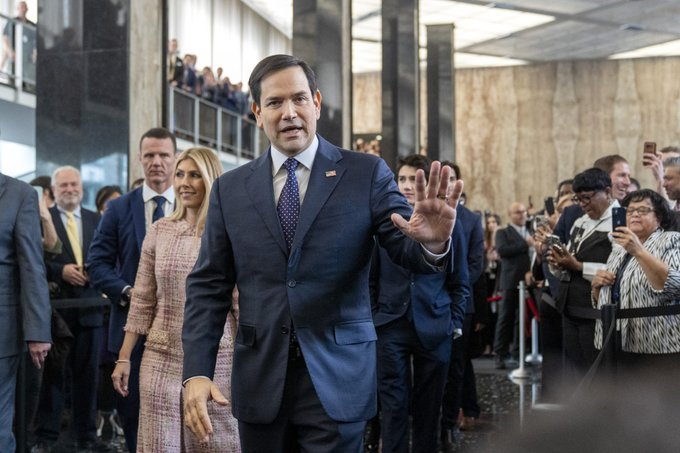News
US Pauses All Foreign Aid Immediately On Trump ‘s Orders; How This Impacts Kenya
US government-driven assistance contributes approximately Sh208 billion annually to the Kenyan economy.

In a move that could significantly impact Kenya and other aid-dependent nations, the U.S. State Department has issued a halt to nearly all foreign assistance, following an executive order by President Donald Trump. This 90-day pause in foreign development aid, aimed at reviewing its alignment with Trump’s foreign policy, is set to disrupt a wide array of programs in Kenya, from health to infrastructure.
The U.S., the world’s largest donor of international aid, disbursed $68 billion in 2023. The current suspension, as detailed in a leaked memo confirmed by the BBC, affects both new and existing aid commitments, with exceptions only for emergency food aid and military funding for Israel and Egypt.
Secretary of State Marco Rubio has underscored the necessity for all foreign spending to make America “stronger”, “safer”, or “more prosperous”, a criterion that now puts numerous U.S.-funded projects in Kenya under scrutiny. The memo mandates that no new funds be obligated without review and approval, and immediate “stop-work” orders are to be issued for current programs.
The cable, drafted by the Department’s foreign assistance office and approved by Secretary of State Marco Rubio, said waivers have been issued for military financing for Israel and Egypt. No other countries were mentioned in the cable.
Israel receives about $3.3 billion in foreign military financing annually, while Egypt receives about $1.3 billion.
The move risks cutting off billions of dollars of life-saving assistance.
Impact on Kenya
Kenya, a significant recipient of U.S. aid, relies on these funds for crucial sectors like health, education, and security.
US government-driven assistance contributes approximately Sh208 billion annually to the Kenyan economy.
This includes (Sh130 billion) in direct bilateral and multilateral assistance per year on average, as well as Sh88.1 billion in indirect contributions from supportive policies.
About 20 US agencies and departments have directly contributed to Kenya’s growth and development since 2001.
They include the United States Agency for International Development (USAID) which spearheads US bilateral efforts in agriculture and food security, education and health.
It has also been supporting devolution, peace building , environment, and sustained economic growth. The halt could mean:
Kenya’s battle against diseases like HIV/AIDS, which has seen U.S. support through initiatives like PEPFAR, might face immediate setbacks. Programs aimed at improving maternal health, fighting malnutrition, and providing vaccinations could be paused, affecting millions of lives.
-mProjects aimed at enhancing economic growth, such as those under the Millennium Challenge Corporation, which involve billions in infrastructure development, risk stalling. This could delay or derail Kenya’s development goals, impacting job creation and economic stability.
U.S. aid has also been channeled into enhancing Kenya’s security capabilities, especially in counter-terrorism efforts against groups like Al-Shabaab. A funding freeze might weaken these initiatives at a time when stability in the region is paramount.
Dave Harden, a former USAID mission director, highlighted the breadth of this decision, noting that even ongoing projects with existing funds must halt operations. This could lead to layoffs among implementing partners and NGOs, further straining local economies and project outcomes.
The ripple effects of this pause are not isolated to Kenya. Globally, similar disruptions are anticipated, but for Kenya, this comes at a time when recovery from past economic shocks like the global effects of the Ukraine conflict and local droughts are still in progress.
While emergency food assistance has been exempted, ensuring that immediate humanitarian crises do not worsen, the broader implications for long-term development are substantial. With the review process set to conclude within 85 days, there’s a window for reassessment, but the interim period could undo years of progress if not managed carefully.
The State Department’s move, while rooted in a policy review, raises questions about the continuity of U.S. commitment to global partnerships. As Kenya and other nations await the outcomes of this review, the immediate focus will be on mitigating the impacts of this funding freeze on ongoing and future development projects.
The State Department has yet to comment publicly on the specifics of how this will affect individual countries like Kenya, leaving many in anticipation and preparation for potentially challenging times ahead.
Kenya Insights allows guest blogging, if you want to be published on Kenya’s most authoritative and accurate blog, have an expose, news TIPS, story angles, human interest stories, drop us an email on [email protected] or via Telegram
-

 Grapevine2 weeks ago
Grapevine2 weeks agoRussian Man’s Secret Sex Recordings Ignite Fury as Questions Mount Over Consent and Easy Pick-Ups in Nairobi
-

 News1 week ago
News1 week agoTHE FIRM IN THE DOCK: How Kaplan and Stratton Became the Most Scrutinised Law Firm in Kenya
-

 Investigations1 week ago
Investigations1 week agoMulti-Million Dollar Fraud: Three Kenyans Face US Extradition in Massive Cybercrime Conspiracy
-

 Economy1 week ago
Economy1 week agoIran Demands Arrest, Prosecution Of Kenya’s Cup of Joe Director Director Over Sh2.6 Billion Tea Fraud
-

 Business1 week ago
Business1 week agoA Farm in Kenya’s Rift Valley Ignites a National Reckoning With Israeli Investment
-

 Africa2 weeks ago
Africa2 weeks agoFBI Investigates Congresswoman Ilhan Omar’s Husband’s Sh3.8 Billion Businesses in Kenya, Somalia and Dubai
-

 Grapevine4 days ago
Grapevine4 days agoA UN Director Based in Nairobi Was Deep in an Intimate Friendship With Epstein — He Even Sent Her a Sex Toy
-

 Politics2 weeks ago
Politics2 weeks agoSifuna, Babu Owino Are Uhuru’s Project, Orengo Is Opportunist, Inconsequential in Kenyan Politics, Miguna Says
















